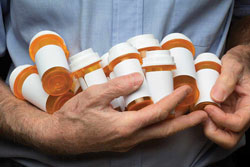The Monmouth University Police Department (MUPD), in conjunction with the Drug Enforcement Administration (DEA), issued an Operation Take Back New Jersey program on Oct. 26. The University community was encouraged to safely dispose of any unwanted, unused and expired prescriptions at the MUPD’s office.
For the third year in a row, MUPD asked that these drugs be brought to law enforcement in an effort to reduce improper use and disposal of prescriptions.
Jeffrey Layton, MUPD Detective Corporal, explained that expired prescriptions may not be effective and excess unnecessary prescriptions in the home could lead to experimentation or abuse. Layton added that improper disposal could also be harmful to the environment.
Operation Take Back is a nationwide effort. The DEA offers the idea to every police department in the state and allows them to voluntarily decide if they would like to participate.
Each year, MUPD collects several pounds of unwanted and expired medications, contributing in the effort to reduce the negative repercussions that occur when they are kept at home. This year, 10 pounds of prescription medications were collected.
Suanne Schaad, Substance Awareness Coordinator, said she hopes this event will reduce the risk of abuse and overdose on campus. “We know about 70 percent of the time people use a prescription pill, it was from a friend or family member’s prescription,” Schaad said.
Prescription drugs are commonly abused on college campuses and are increasingly being used by young adults. “On college campuses, we usually see the opioid family of drugs, like OxyContin or Percocet,” Schaad said. “We also see the stimulants, like Vyvance or Ritallin. There does seem to be an increase in the stimulant drugs around exam times.”
A few consequences of abusing stimulants include paranoia, an increase in body temperature, sleeping problems, and increased heart rate, Schaad explained. “Someone could have an underlying medical issue and you don’t know how the medicine could affect you. This is one of the dangers of taking someone else’s prescription.”
Students at the University are recognizing that prescription drug abuse is becoming more common. Although, abusers are using them to help with class and their social lives.
Amy Rensimer, sophmore chemistry major, said, “I think college students have been abusing prescription drugs, specifically the ADD and ADHD medications, because it helps them to focus on homework.”
She added, “Students also abuse pain medication to provide them with a better time on the weekends.”
Since prescription drug abuse is becoming more common, the DEA is looking for new ways to combat the issue. A New York Times article titled “Rise in Pill Abuse Forces New Look at U.S. Drug Fight,” stated, “America’s drug problem is shifting from illicit substances like cocaine to abuse of prescription painkillers, a change that is forcing policy makers to re-examine the long and expensive strategy of trying to stop illegal drugs from entering the United States.”
Layton said the University has a zero-tolerance policy and if an individual is caught with drugs, he or she will be criminally prosecuted.
Schaad encourages students to visit the Office of Substance Awareness for problems related to all types of drugs, including prescription pills. “It is a safe, free and confidential place for students to address the issue and make any changes they are ready for. I have helped students get into detox programs, inpatient programs or outpatient detox when needed,” Schaad said.
Operation Take Back New Jersey requires that those who dispose of the medications safely at the law enforcement agencies remain anonymous. No identification requests are made, and those who participate should remove the label from the bottle.
PHOTO TAKEN from shopsouthgate.com




